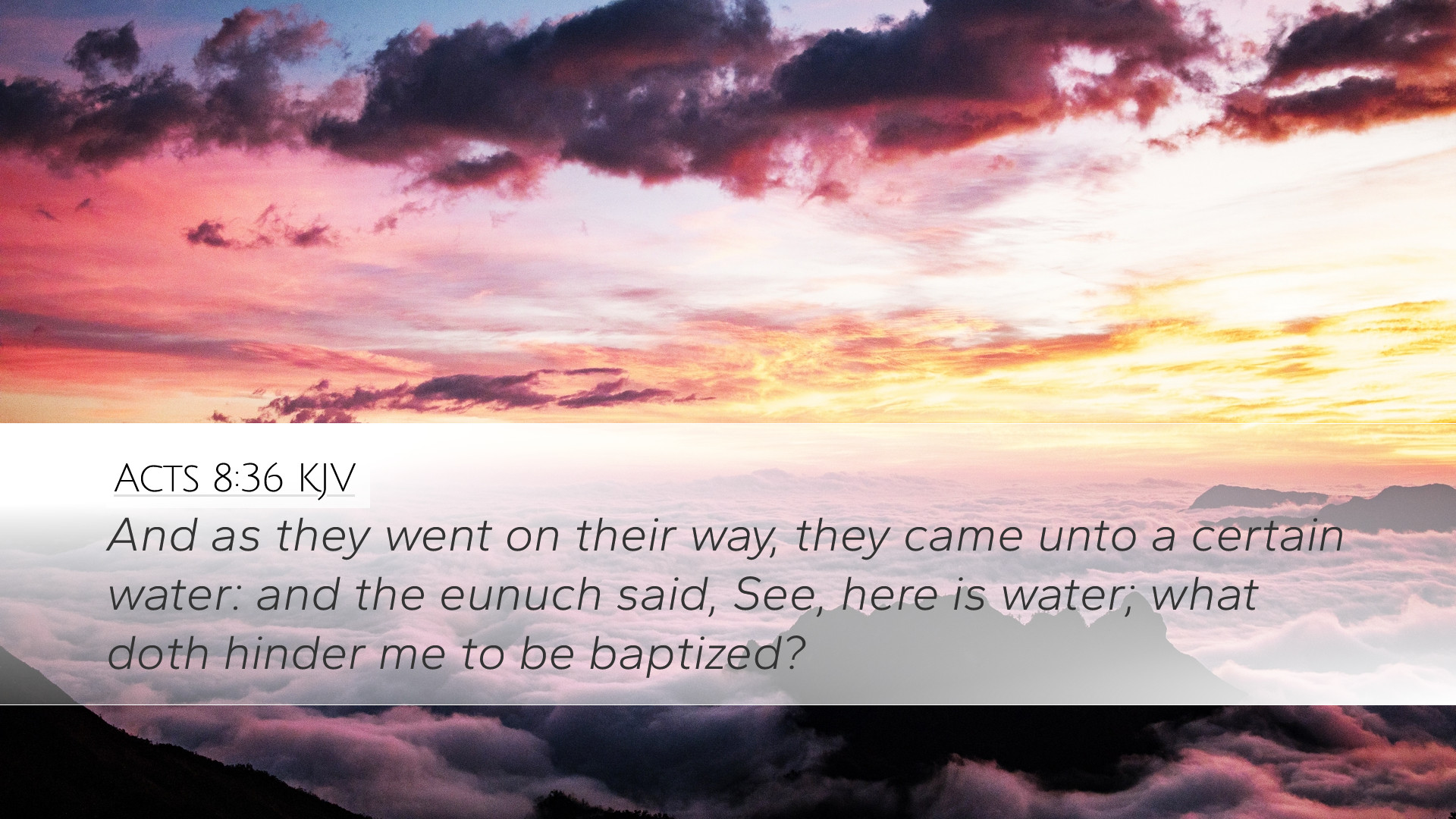Acts 8:36
"And as they went on their way, they came unto a certain water: and the eunuch said, See, here is water; what doth hinder me to be baptized?"
Commentary Overview
This verse captures a significant moment in the early Christian church, illustrating the immediate response of the Ethiopian eunuch to the message he had just received from Philip. To understand the depth of this moment, it is essential to explore the context, the implications of baptism, and the theological significance as highlighted by renowned commentators like Matthew Henry, Albert Barnes, and Adam Clarke.
Contextual Background
Acts 8 narrates the story of Philip, one of the seven deacons, being led by the Spirit to witness to an Ethiopian eunuch who was reading from the book of Isaiah. The eunuch's inquiry about the prophetic text sets the stage for a spiritual conversion. Philip, guided by divine intervention, explains the scripture, leading the eunuch to faith in Jesus Christ.
Matthew Henry's Insights
Matthew Henry emphasizes the importance of the eunuch's transformation and immediate desire for baptism. He notes that the eunuch, having grasped the message of salvation, does not hesitate. Henry points out that this reflects a key aspect of genuine faith: it leads to action. The eunuch’s question, "what doth hinder me to be baptized?" signifies a readiness to publicly affirm his faith. Henry asserts that the eunuch’s inquiry indicates he understands the necessity of baptism as an outward sign of his internal faith.
Albert Barnes' Commentary
Albert Barnes provides an analysis of the theological implications of baptism as portrayed in this verse. He posits that the eunuch’s eagerness to be baptized correlates with the New Testament understanding of baptism as a covenantal act. Barnes argues that the act of baptism signifies a believer's identification with Christ’s death and resurrection. The phrase "what doth hinder me?" reveals a heart that is not only convinced but also actively seeking obedience to Christ’s command. Barnes highlights the necessity of baptism in the early church, describing it as integral to the believer's initiation into the community of faith.
Adam Clarke's Perspective
Adam Clarke elaborates on the cultural and social dimensions of the eunuch's request. He notes that, as a eunuch, the man faced exclusion in certain aspects of Jewish law, yet here he seeks to fully enter into the community of faith through baptism. Clarke suggests that this act of baptism serves as a powerful declaration of the inclusivity of the Gospel. He highlights that the availability of water at this moment signifies the readiness of God to accept all who believe, breaking down barriers that existed within society and religious practice.
The Significance of Baptism
The significance of baptism in this verse cannot be understated. It serves as both a personal commitment and a communal affirmation. Philip's willingness to baptize the eunuch demonstrates the early church's understanding that faith must be accompanied by action. This is further echoed by the eunuch's immediate response, which shows that understanding leads to obedience. Baptism, therefore, is portrayed not merely as a ritual but as an essential step in the believer's journey.
Theological Implications
This small yet profound passage invites a broader theological reflection on several key themes:
- The Role of the Holy Spirit: The Spirit's guidance in leading Philip to the eunuch illustrates the active participation of God in the evangelistic mission.
- Inclusivity of the Gospel: The eunuch’s conversion challenges societal norms, highlighting that faith is accessible to all, regardless of nationality or social status.
- Immediate Response to Faith: The eagerness of the eunuch to be baptized exemplifies the urgent nature of personal faith in Christ and the necessity of obedience to His teachings.
- Baptism as a Covenant Sign: Recognizing baptism as an entrance into the new covenant provides a deeper understanding of its significance for community and personal faith.
Application for Pastors, Students, and Theologians
For pastors, this verse serves as a powerful reminder of the importance of teaching and encouraging baptism as a vital step in the believer's journey. The narrative illustrates the call to readiness and the importance of presenting the message of Christ clearly to those seeking faith.
Students of theology can glean from this passage a deeper understanding of the intersection of faith, culture, and the transformative power of the Gospel. The eunuch's story encourages ongoing exploration of how the Gospel breaks barriers and invites all to participate in the life of faith.
For scholars, Acts 8:36 stands as a critical passage for examining early church practices, the theological implications of baptism, and the way societal issues influenced the dissemination of the Gospel. Researching this verse opens avenues for discussions on soteriology, ecclesiology, and the ongoing impact of the early church on contemporary Christian practices.
Conclusion
Acts 8:36 is not just a historical account but a transformative narrative that invites readers into the deeper theological understandings of faith, baptism, and inclusiveness in Christ. It encapsulates the essence of the Christian faith—belief and action intertwined. As we reflect on this verse, may we be inspired to embrace the transformative power of the Gospel and extend its reach to all, as exemplified by Philip and the Ethiopian eunuch.


